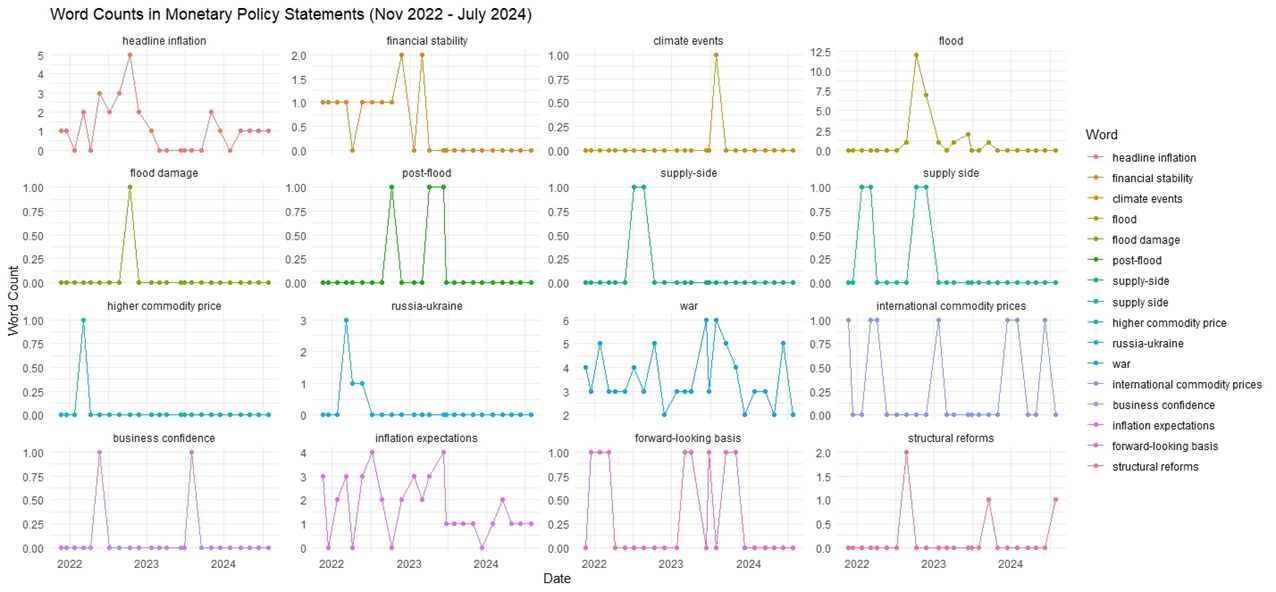Is high inflation the price for an independent SBP? – A Measured Response
An article titled "Is high inflation the price for an independent SBP?" was published in the Express Tribune on September 2, 2024, which in my humble point of view needs an immediate response to ensure that it does not undermine the confidence of people of Pakistan in an extremely important and credible public institute, the State Bank of Pakistan (SBP).
The author has raised concerns about Pakistan's economic management strategy, specifically in light of SBP's autonomy. However, holding SBP's interest rate policy responsible for country's high inflation for the past 3 years or so oversimplifies the complex and deep-rooted economic challenges facing Pakistan. Therefore, a more careful analysis would reveal that while SBP's autonomy is crucial, but it has to be complemented by comprehensive structural reforms to address the underlying causes of inflation. In addition, the arguments presented overlook the crucial role of inflation expectations and the likely consequence of eroding SBP's credibility. By focusing solely on the SBP policy rate and inflation outturns, the article fails to recognize the broader economic dynamics at play and the long-term significance of a credible and independent central bank.
Inflation expectations play an important role in determining actual inflation, for example, when businesses and consumers expect prices to rise, they adjust their behaviour accordingly, that is, by demanding higher wages and raising prices, respectively. This creates a self-fulfilling prophecy, where inflation becomes entrenched, driven by expectations of future inflation than by current economic conditions. SBP's autonomy is essential in anchoring these expectations; by committing to meet a publicly announced target range of inflation, it signals to the general public that it will take all the necessary steps to keep inflation under check. Thus, helping to prevent expectations from becoming unanchored, which will definitely make inflation more difficult to manage.
Supply-side shocks are known to bring episodes of persistent inflation; however, if inflation expectations are well-anchored, even supply-side shocks are less likely to lead to persistent inflation, as businesses and consumers trust that the central bank will take appropriate measures to stabilize prices. Therefore, if SBP's commitment to contain inflation is questioned either through misguided criticism or perceived political influence, it could unanchor expectations, and in the long-term damage from erosion of SBP's credibility can far outweigh any perceived short-term gain from questioning its policies.
The article also proposes a 50% tax on large savers in government securities, with the aim of disincentivizing savings in these instruments and encouraging investment in other sectors. While this suggestion may appear to be an effective way of redirecting funds to the private sector for productive uses, it overlooks the fact that financial institutions, particularly banks, are already subject to a hefty 39% of their earnings. This tax on banking income, in my humble view is high because the banks in Pakistan prefer to invest to take advantage of risk-free guaranteed return by parking their funds in Government securities than engaging in riskier private-sector lending. However, this preference of the banks may not only be for earning profit but may also reflect the underlying economic conditions, that is, high level of economic uncertainty, weak enforcement of legal contracts, and a higher risk associated with lending to the private sector.
Imposing a 50% tax would reduce incentive for banks and large investors to hold government securities, thus destabilizing the market for these instruments and a probably increase in Government's borrowing cost. Therefore, instead of penalizing savers, the focus should be on creating a conducive environment for private sector investment by addressing the structural impediments, law and order situation, proper enforcement of foreclosure in case of non-payment by a private entity, among others. Thus, the issue is not that savers are earning too much from Government securities, but that the risks and barriers to investing in the private sector are too high. Addressing these issues would do far more to stimulate economic growth than punitive taxation measures proposed in the article.
The article further claims that the government and the State Bank of Pakistan (SBP) have failed to consider supply-side inflation in their monetary policy decisions. However, a basic world count textual analysis of the monetary policy statements rate paints a very different picture. The SBP has continuously factored in any supply-side inflationary pressures arising from domestic as well as external issues while setting interest rates and shaping monetary policy (see Figure 1). Apart from its mandate of headline inflation and financial stability, Figure 1 shows that research staff and the policymakers at the SBP have factored in events that may drive inflation from the events driven by climate events domestically, such as the floods of 2022, damage from floods, post-flood assessment of the economy, or international events like the Ukraine-Russia war, which raised the international commodity prices considerably. It has also remained forward-looking in managing inflation expectations while keeping in view the confidence of businesses in the economy that may have been affected by these events. Finally, the central bank also pointed towards structural reforms time and again during the time it raised the SBP policy rate during the past 3 years.
In conclusion, the textual analysis conducted shows that SBP's policy discourse already incorporates supply-side factors emerging from domestic or global events. Thus, the claim that these elements are ignored is unfounded. It is suggested that learned community of academics and researchers instead of critiquing the SBP's autonomy and effectiveness, should focus on supporting SBP's effort to fight inflation with well-informed forward-looking policy framework already in place, while advocating complementary fiscal and structural reforms. In my humble view, by maintaining its credibility and focusing on its mandate, SBP is doing exactly what is required to safeguard Pakistan's economic stability in a volatile global environment.


Author Details:
Dr. Syed Ateeb Akhter Shah
The writer is an ex-Deputy Director, Research Department, State Bank of Pakistan. At present, he serves as the Director, Economic Growth and Forecasting Lab and Research Fellow at CBER, Institute of Business Administration, Karachi
EGF Blogs
© Institute of Business Administration (IBA) Karachi. All Rights Reserved.